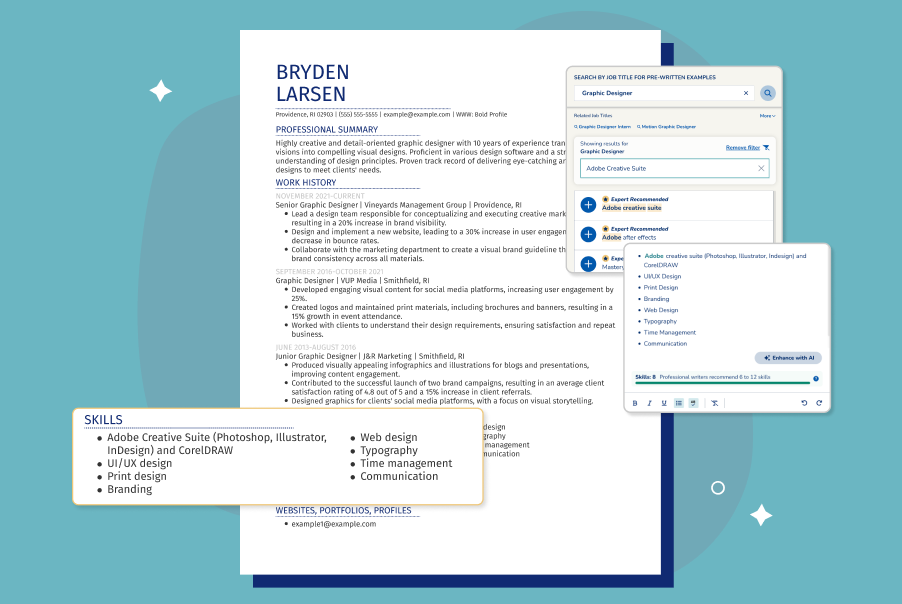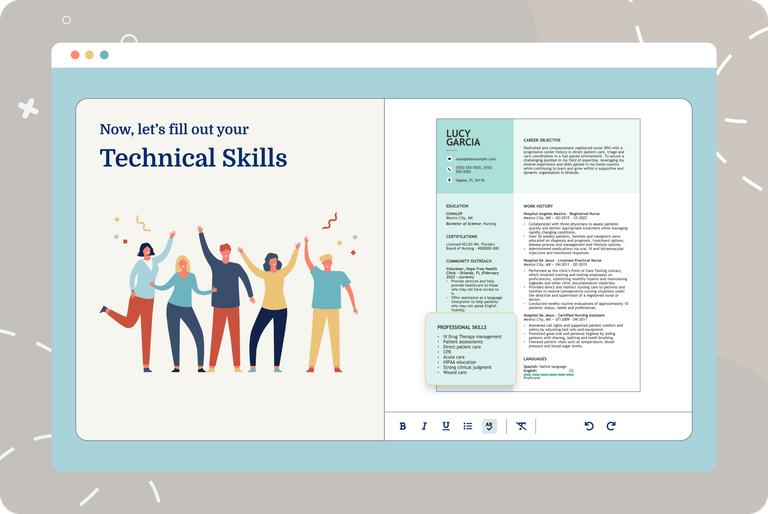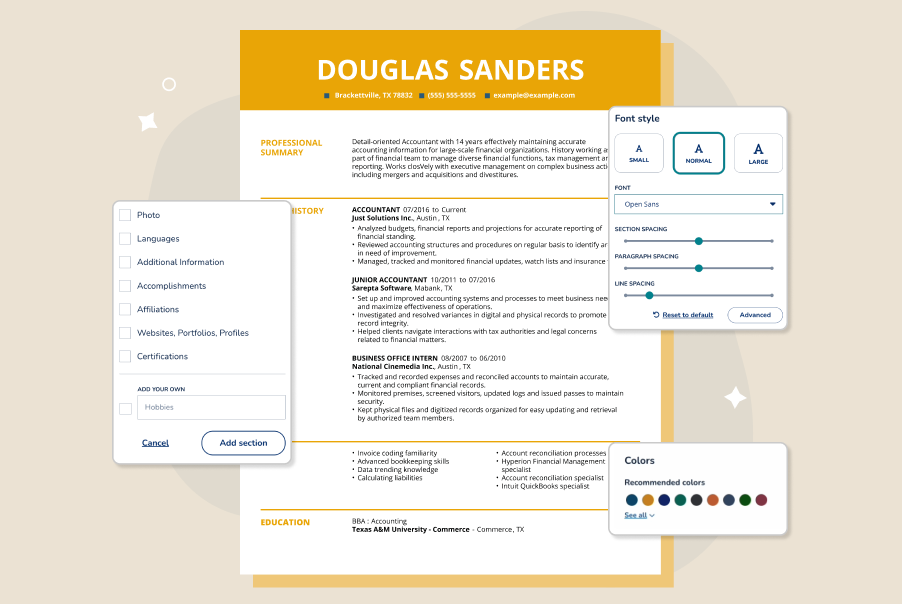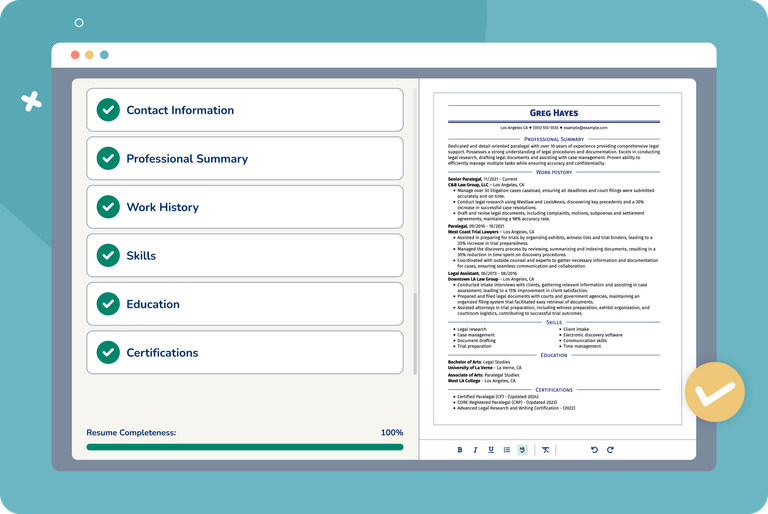130+ Hobbies to List on a Resume (Examples & Guide)

Our customers have been hired at: *Foot Note
Table of Contents
Get started with MyPerfectResume today!
- Build a resume on any device
- Pick an ATS-friendly template
- Tailor with AI copy suggestions
When it comes to crafting a standout resume, most job seekers focus on professional experience, education, and skills. But there’s one often-overlooked section that can offer valuable insight into who you are beyond the job title: your hobbies.
Far from being filler, the right personal interests can showcase soft skills, cultural fit, and even leadership potential. In a competitive job market, the hobbies you list might give you an unexpected edge.
The key? Knowing which hobbies to put on a resume and how to do so strategically.
Should You Put Hobbies on a Resume?
Including job-relevant hobbies on a resume can significantly improve your chances of capturing the attention of potential employers.
While it may seem unusual to showcase your personal interests, doing so can provide valuable insights into your character and job-related abilities.
For instance, participating in team sports exhibits teamwork abilities, while playing musical instruments showcases discipline and dedication.
You can use our Resume Builder to quickly and easily add a hobbies and interests section to your resume. Here is an example of a compelling resume with a hobbies section:
When to include hobbies and interests on a resume
Including hobbies on your resume can help bolster your job application if you lack certain professional skills required for a job or direct experience in a particular field.
Hobbies and interests on a resume work best when they are directly related to the job requirements and the company or team culture.
Here are a few factors to consider when deciding whether or not to list hobbies on your resume:
- Relevance to the job: If your hobbies relate directly to the job you're applying for, they can demonstrate applicable skills or knowledge. For instance, coding projects for a software development role or photography for a graphic design resume.
- Soft skills: Hobbies can highlight soft skills that might not be evident from your employment history alone, such as teamwork (from playing a sport), creativity (from activities like painting), or leadership (from volunteer experience or clubs).
- Cultural fit: Some companies value cultural fit as much as technical skills. Hobbies can signal that you share the company’s values or would gel with the team, particularly in organizations that emphasize work-life balance.
- Gaps in work experience: If you're new to the workforce, returning after an employment gap, or changing careers, hobbies can offer talking points that connect your personal experiences to the job requirements.
What Are Good Hobbies to Put on a Resume?
Your resume should include hobbies that reflect your individual passions while demonstrating qualities relevant to the position and beneficial to the workplace.
Here are a few hobbies examples that convey a breadth of skills and professionalism across a range of industries and roles:
- Community involvement: Showcasing community service demonstrates that you are committed to helping others and can work with people from various backgrounds. It also provides an opportunity to highlight your project management skills.
- Creative activities: Listing creative pursuits such as writing, photography, and playing a musical instrument shows that you are willing to think outside of the box and can bring innovative solutions to the workplace.
- Multicultural interests: Adding multicultural hobbies to your resume such as international travel or language training can indicate that you have strong communication, collaboration, and conflict resolution skills.
- Intellectual pursuits: Strategic games like chess and competitions such as debates and spelling bees are excellent hobbies for a resume because they show that you are skilled at strategic and tactical thinking, analysis, and problem-solving.
- Professional affiliations: If you are actively involved in a job-relevant professional organization, industry association, or informal group related to your desired job title or career, add those interests to your resume.
Examples of Hobbies to Put on a Resume
When writing your resume, including hobbies will work in your favor if they align with your chosen job and the skills required for the industry. Below are resume hobby examples broken down by skill set.
Hobbies that showcase communication skills
Hobbies for a resume to demonstrate communication skills:
- Blogging
- Giving speeches
- Hosting events
- Acting
- Improvisation
- Debating
- Singing
- Networking
- Storytelling
- Social media
Hobbies that demonstrate leadership skills
Hobbies to put on a resume to demonstrate leadership skills:
- Mentoring
- Coaching
- Habitat for Humanity volunteer
- Fundraising
- Organizing community events
- Animal rescue
- Planning parties
- Student government
- Running a book club
- Administering a neighborhood outreach
Hobbies that highlight interpersonal skills
Best hobbies for your resume to showcase interpersonal skills:
- Volunteering at a shelter, senior center, or school
- Being part of a school club or professional association
- Role-playing games
- Counseling others
- Mediation
- Group exercise
- Community gardening
- Tutoring
- Peace Corps
Hobbies that require problem-solving skills
Hobbies for a resume that demonstrate problem-solving skills:
- Chess
- Sudoku
- Coding
- Crosswords
- Jigsaw puzzles
- Magic tricks
- Logic games
- Word games
- Card games
- Cooking or baking
Hobbies that reflect teamwork skills
Hobbies to put on a resume that convey teamwork and collaboration:
- Tabletop gaming
- Trivia
- Board game nights
- Team sports
- Puzzle building
- Charades
- Dance classes
- Group art projects
- Volunteer neighborhood cleanup projects
Hobbies that indicate research skills
Hobbies and interests that demonstrate your strengths in research:
- Listening to podcasts
- Doing puzzles
- Watching documentaries
- Collecting data
- Interviewing people
- Making infographics
- Writing
- Taking online classes
- Reading
Hobbies that showcase creative skills
Hobbies to list on a resume that shows creativity:
- Photography
- Drawing
- Crafting
- Music composition
- Pottery
- Digital art
- Creative writing
- Sewing
- Interior design
- Scrapbooking
- Poetry
Hobbies that emphasize technical skills
Hobbies to put on a resume that showcases your technical skills:
- Programming
- Web development
- Video game design
- Robotics/automation
- Database management
- Graphic design
- Cybersecurity
- Software development
- Mobile app development
- Animation
Hobbies that cultivate analytical skills
Hobbies and interests for a resume that demonstrates analytical skills:
- Science
- Model building
- Data visualization
- Astronomy
- Accounting
- Investing
- Logic puzzles
- Math
- Geocaching
- Video games
Hobbies that showcase organizational skills
Hobbies for a resume that showcases your organizational skills:
- Keeping a journal
- Managing a budget
- Creating business models
- Researching
- Project management
- DIY projects
- Feng Shui
- Meal planning
- Home repair
- Creating spreadsheets
Hobbies that build presentation skills
Hobbies to list on a resume that involve presentation skills:
- Vlogging
- Creating podcasts
- Audio journaling
- Videography
- Photojournalism
- Public speaking
- Theater
- Teaching yoga
- Drama club
- Creating websites
Hobbies that highlight adaptability
Hobbies for a resume that emphasizes your ability to adapt to new situations:
- Hiking
- Camping
- Extreme sports
- Winter sports
- Travel
- Learning new languages
- Rock climbing
- Horseback riding
- Flying a plane
- Scuba diving
Hobbies that cultivate a strong work ethic
Hobbies and interests for a resume that highlights your strong work ethic:
- Volunteering
- Community service
- Networking
- Reading professional books or articles
- Learning new skills
- Taking online courses
- Joining professional organizations
- Creating or updating a portfolio
- Participating in mentorship programs
- Building a website
How to List Hobbies on a Resume
Follow these steps to effectively showcase your hobbies and interests on your resume:
Align your hobbies with the job description
Before you get started, review the job description to determine if your hobbies align with the requirements of the role. Look for:
- Required skills: For example, if the job requires analytical thinking, what hobbies do you have to match? Maybe you recently won a local chess competition. Tie your competitive chess interest to the job's preferred skills.
- Company's values and mission: Research the company to get an idea of its organizational culture. Then, create a targeted resume by featuring any hobbies you have that showcase the company values. For example, if you're applying for a company that values sustainability and you enjoy composting, that's a great hobby to include.
Add hobbies to relevant sections of your resume
After matching your hobbies with the company’s needs and values and aligning them with your job-relevant skills, you’re ready to put hobbies and interests on your resume.
Let's go over each resume section:
Resume objective
A resume objective summarizes your most relevant skills and experience to quickly grab hiring managers' attention. You should only add hobbies in this section if you have limited experience but relevant interests that directly relate to your desired role.
Take a look at this example:
Education
A creative way to display hobbies on a resume is to add them to your education section as “Activities and Interests." This is beneficial if you are a student applying for an internship.
You can display your interests separately to highlight them. For example:
EDUCATION
Bachelor of Science in Environmental Science
University of Massachusetts Boston – Boston, MA
Graduated: May 2024
GPA: 3.7
Relevant coursework: Environmental Impact Assessment, Ecology & Biodiversity, Geographic Information Systems (GIS), Climate Change Policy, Soil and Water Science
Senior Capstone Project: Analyzed urban heat island effects and proposed green roof solutions for densely populated areas in Boston.
Activities and Interests:
Member, Student Sustainability Council
Volunteer, GrowGreen Neighborhood Urban Gardening Initiative
Work experience
Adding hobbies and interests to work experience is an excellent way to show commitment to professional development when you're a recent graduate or have employment gaps.
Here's how you can do it:
WORK EXPERIENCE
Community Urban Gardening Volunteer
GrowGreen Neighborhood Initiative | Boston, MA
June 2023 – Present
Collaborate with local residents to design, plant, and maintain a sustainable community garden focused on native species and pollinator-friendly practices.
Educate community members on composting, water conservation, and zero-waste gardening techniques through monthly workshops and events.
Lead a volunteer team of 10+ during seasonal planting and cleanup drives, fostering environmental awareness and civic engagement.
Contributed data on soil quality and biodiversity to support a city-led green infrastructure grant application.
Hobbies and interests section
A common way to add hobbies on a resume is to include them in a separate section. This option is especially relevant for more experienced candidates looking to simply boost their resume instead of compensate for limited experience.
Regardless of your resume format, the hobbies and interest section should live at the bottom of your resume.
A good rule of thumb is to add no more than five hobbies or interests to this section and to format them with bullet points.
Here is an example of how your hobbies and interests resume section might look:
HOBBIES & INTERESTS
Urban gardening: Volunteer with a local initiative promoting sustainable food systems and green space development.
Hiking & nature conservation: Regularly explore local trails while practicing and advocating for Leave No Trace principles.
Native plant restoration: Passionate about ecological landscaping and biodiversity through the use of region-specific flora.
Sustainable living: Committed to zero-waste practices, composting, and environmental education in daily life.
Environmental advocacy: Active in campus and community efforts to raise awareness around climate change and resource conservation.
Examples of Resumes With Hobbies
If you choose to include a separate section for hobbies and interests on your resume, keep it brief and add it to the bottom of your resume. Below are a few resume examples to inspire you.
Tips for Listing Hobbies on a Resume
Now that you know the best hobbies and interests to put on a resume and how to display them, here are some tips for making them shine.
- Choose relevant hobbies: Select hobbies that are relevant to the job or demonstrate transferable skills that are applicable to the role. For example, if you are applying for a job that requires creativity, hobbies like painting or writing can be advantageous.
- Be specific: Rather than listing generic hobbies, be more specific to give a clearer picture of your interests and skills. For instance, instead of saying "reading," you might specify "reading historical nonfiction" or "reading contemporary American literature."
- Quantify achievements: If possible, quantify your hobbies to show tangible outcomes or commitment. For example, "Competed in regional chess tournaments, placing in the top 10%," shows both skill and dedication.
- Showcase soft skills: Use hobbies to highlight your soft skills. Activities like team sports can emphasize teamwork and leadership, while solo hobbies like blogging can highlight independence and communication skills.
- Keep it concise: Your hobbies should not overshadow your professional experience and skills. A brief, well-curated list of hobbies can enhance your resume without exceeding the ideal resume length.
Hobbies That Should Not Be Included on a Resume
While hobbies can enhance your resume by providing a more complete picture of who you are, some hobbies might be less beneficial or even potentially harmful to include. For example:
- Irrelevant hobbies: Hobbies unrelated to the job or that don't showcase transferable skills might not be worth including as they don't add value to your application and could distract from more important qualifications.
- Controversial or polarizing activities: Avoid hobbies that could be viewed as controversial or polarizing, such as political activities or controversial advocacy, unless you are certain they align with the company's culture or are relevant to the position.
- Common or vague interests: Generic hobbies like "reading," "traveling," or "watching movies" don't add much uniqueness or value unless you can present them in a way that highlights specific skills or exceptional involvement.
- High-risk activities: Sometimes, hobbies that involve high risk (like extreme sports) can be seen as a potential liability, especially if the job requires consistent physical presence and the hobby might lead to frequent injuries.
- Time-consuming hobbies: Hobbies that appear to take a lot of time might raise concerns about your availability and commitment to the job, especially if they seem like more than just casual interests.
The key is to tailor the hobbies section of your resume to reflect interests that enhance your candidacy, showcasing traits like dedication, creativity, and a good cultural fit for the organization.
Key Takeaways
- Hobbies can be a great addition to any resume if they're relevant to the job and can expand on your skill set.
- Including hobbies on your resume can help to fill in employment gaps, display soft skills, or showcase a cultural fit.
- Always align your hobbies and interests to the job's requirements.
- Be brief and only list a few hobbies or interests and explain why they are important to you.
- Hobbies on a resume make the most impact if you have little to no work experience.
FAQ
How many hobbies should I include on my resume?
When it comes to listing hobbies on a resume, it is important to keep it to a select few. You want to make sure that you list only hobbies that are relevant to the job you are applying for and emphasize your skills.
Generally, three to five hobbies is a good number to list as it is enough to demonstrate your interests without taking up too much space on your resume. See what a resume should look like for design tips and examples from certified career experts.
How should I format hobbies on my resume?
When listing hobbies and interests on your resume, it is best to use a bulleted list format for easy scanning.
This makes the information easy to read and allows the reader to quickly identify and focus on the most important details.
Make sure to keep your list concise and to the point, and to select hobbies and interests that are relevant to the position you are applying for.
What is the difference between hobbies and interests?
Hobbies and interests on a resume are both ways for a person to express their personality, character, and skills, but there are differences between them.
Hobbies are specific and personal activities that a person does in their free time for pleasure, such as gardening, playing a musical instrument, or cooking.
Interests are broader topics that a person may be passionate about, such as current events or specific social causes.
Our customers have been hired at:*Foot Note








